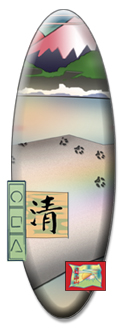On The Way: The Daily Zen Journal
How to be a Householder Bodhisattva
Yuan wu (1063-1135)
This affair is a matter of people of sharp faculties and superior wisdom who do not consider it difficult to understand a thousand when hearing one. It requires a stand that is solid and true and faith that is thoroughgoing.
Then you can hold fast and act the master and take all sorts of adverse and favorable situations and differing circumstances and fuse them into one whole—a whole that is like empty space, without the least obstruction, profoundly clear, empty and illuminated, never changing even in a hundred eons or a thousand lifetimes, unitary from beginning to end. Only then do you find peace and tranquility.

I have seen many people who are intellectually brilliant but whose faculties are unstable and whose practice is shallow. They think they witness transformation in verbal statements, and they assume that there is no way to go beyond the worldly.
Thus they increase the thorns of arbitrary opinion as they show off their ability and understanding. They take advantage of their verbal agility and think that the Buddha Dharma is like this. When situations are born from causal conditions, they cannot pass through to freedom, so they wind up vacillating back and forth. This is really a great pity!
This is why the ancients went through all sorts of experiences and faced all sorts of demons and difficulties. They might be cut to pieces, but then never gave it a thought; they took charge of their minds all the way along and made them as strong as iron or stone.

Thus when it came to passing through birth-and-death, they didn’t waste any effort. Isn’t this where the special strength and generosity beyond emotionalism that truly great people possess lies?
When bodhisattvas who live a householder’s life cultivate the practices of home-leavers, it is like a lotus blooming in the fire. It will always be hard to tame the will for fame and rank and power and position, not to mention all the myriad starting points of vexation and turmoil associated with the burning house of worldly existence.
The only way is for you yourself to realize your fundamental real, wondrous wholeness and reach the stage of great calm and stability and rest.

It would be best if you managed to cast off everything and be empty and ordinary. Thoroughly experience the absence of conditioned mind and observe that all phenomena are like dreams and magical illusions.
Be empty all the way through, and continue on clearing out your mind according to the time and the situation. Then you will have the same correct foundation as all the great enlightened lay people in Buddhist tradition.
According to your own measure of power, you will transform those not yet enlightened so you can enter together into the uncontrived, uncluttered ocean of true nature. Then your life here on this earth will not be a loss.
Yuan wu (1063-1135)
Excerpted from A New Zen Reader ed Nelson Foster and Jack Shoemaker





Sometimes just a phrase says it all. “Householder Bodhisattva” applies to those of us who have stayed in the world, but not of it.
That is what our practice is partly about, walking with a foot in both worlds or multiple worlds as the case might be. The sutras paint bodhisattvas as close to godly beings, certainly much further along the path than we are.
The truth is that anytime we live free from anger, greed, or delusions, we are closer to being bodhisattvas than we imagine.
Being free of thinking of ourselves as bodhisattvas or ordinary people or home-leavers confers an automatic entry into the “no one special” state where who we are cannot be held onto or defined.
Where we “are” on the path is unknown and not necessary to live like bodhisattvas no matter where we find ourselves. When we live as if our actions affect the entire whole here, then right livelihood, right actions, and compassion are right where we stand.
Your Friend along the Way,
Elana, Scribe for Daily Zen